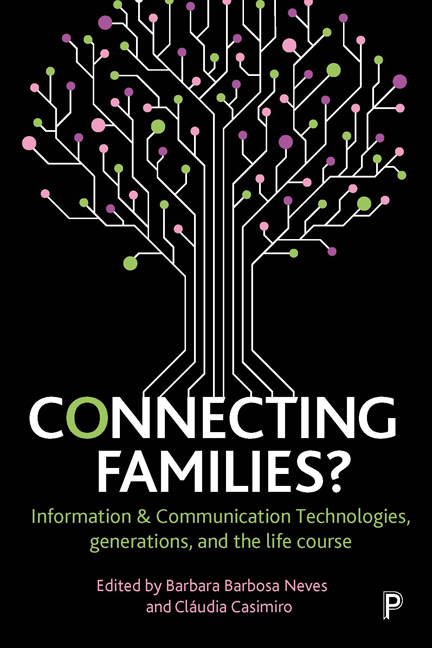Book contents
seven - Cross-disciplinary research methods to study technology use, family, and life course dynamics: lessons from an action research project on social isolation and loneliness in later life
Published online by Cambridge University Press: 22 April 2022
Summary
Introduction
As research on the relationship between digital technology and family life is emerging as an important topic for family scholars (Neves and Casimiro, 2018), what can we learn from sociotechnical research designed and conducted by social and computer scientists? What do we gain by combining cross-disciplinary methods to study technology adoption and its outcomes within family and life course contexts? What challenges do we face? This chapter considers these questions by drawing on a mixed methods project on technology and social connectedness, facilitated by a team of sociologists and human‒computer interaction (HCI) researchers (Baecker et al, 2014; Neves et al, 2015, 2017a, 2017b). Informed by sociological studies of technology (MacKenzie and Wajcman, 1999), the team shared a conceptualization of technology as a sociotechnical process of interconnection between technological and human elements.
HCI, a sub-field of computer science and engineering, emerged in the early 1980s to ensure that ‘humans and computers [are] interacting to perform work effectively’ (Long and Dowell, 1989, p 6). Recently, a growing epistemological shift from a system-centred to a human-centred approach has moved the discipline ‘from evaluation of interfaces through design of systems and into general sense-making of our world’ (Bannon, 2011, p 50). This ‘human-centred informatics’ lens has relocated some HCI work from laboratories to the field, aligning with a sociological quest to understand the complex interplay of social and technological dimensions in everyday life. As such, we posit that both disciplines gain from combining methods and collaboratively studying sociotechnical systems, including how digital technology affects family dynamics and vice versa.
The cross-disciplinary work presented here is based on an action research project that evaluated a new digital technology to tackle social isolation and loneliness in later life. As action research projects are focused on addressing practical issues through involving researchers and participants as co-collaborators (Berg, 2004), this strategy enabled systematic action to both solve a problem and advance scientific knowledge in a critical area. Furthermore, action research projects follow a pragmatist epistemology, allowing use of multiple methods (Ivankova, 2014). Although action research projects are employed in both HCI and sociology, cross-disciplinary and mixed methods approaches remain scant, particularly in the study of interventions to tackle social isolation and loneliness among older adults (Franz et al, 2015; Neves et al, 2017b).
- Type
- Chapter
- Information
- Connecting Families?Information and Communication Technologies, Generations, and the Life Course, pp. 113 - 132Publisher: Bristol University PressPrint publication year: 2018



